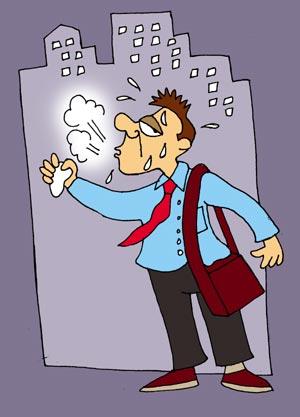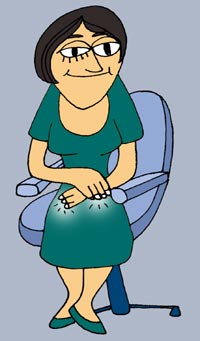
Twenty eight-year-old Juhi Seth Kapoor joined a public relations agency as a corporate communication trainee five years ago. Today, she's risen in the ranks to become a senior public relations executive. Here, Juhi recounts the nervousness and excitement of appearing for her first job interview and cracking it. Importantly, she shares the lessons she learnt in the process. Illustrations: Uttam Ghosh
Lesson 1: When you are a fresher, you must keep your options open
The year was 2006.
After completing my graduation in journalism from Mumbai University, I re-applied for a masters degree in sociology.
Since there were a few months left for me to kill before the course, I started looking up job opportunities.
I wanted to pursue a career as a broadcast journalist. The prospect of being at the scene of action and reporting events live as they happened had always thrilled and inspired me.
A year prior, when I was in my second year of senior college, I e-mailed my CV across to a few news organisations for internships. Some of them reverted, saying they would get in touch with me when they had an opening, while others simply turned down my application.
Now a whole year had passed and there wasn't a single news agency I hadn't applied to. It was disheartening, but how could I let go of my dream so soon, so easily?
As months passed, the road ahead seemed uncertain to me. At that point of time, I wasn't sure if I should go ahead and follow my dream by pursuing my post-graduation, or take up any job that came to me.
I am sure most graduates undergo these challenges at some point in their lives.
I spoke to a few people from the profession and they advised me not be too adamant about my options at the start of my career. They advised me to try looking for opportunities beyond TV channels and make the most of my communication skills.
...
One's first job offer is usually a cherished memory. From the excitement of dressing up perfectly to rehearsing the perfect handshake and opening line, we've all had our unique moments.
We ask you, dear readers, to tell us about how you got your first job and the lessons learnt as a result.
To share your story, write in to us at getahead@rediff.co.in (subject line: 'How I got my first job') along with a photograph, if possible and we will publish the best entries right here.

Lesson 2: If you are a fresher, your CV should highlight the areas you excel in. Focus on your skills and achievements rather than your academic scores.
I looked up my CV once again and I realised that my two-month marketing internship with a leading publishing group had been inadvertently sidelined.
Also, there was too much information about my projects at graduation level, which were probably insignificant.
So I decided to highlight my achievements and experience from the summer internship with brief information on my journalism projects. It took me quite some time to sift through what was relevant and what was insignificant.
Once that was done, I uploaded a fresh CV on Naukri.com.
Within two weeks, I received my first call for an interview.

Lesson 3: Never underestimate the time it will take you to commute -- always try to reach the venue 15 minutes before your scheduled interview time.
The consultant who contacted me said the vacancy was for a corporate communication professional and they were hiring fresh graduates.
Since I received the call late in the evening, I did not have much time to prepare for the interview -- it was scheduled for 11 am the following day.
I quickly went to a nearby cyber cafe and printed out two copies of my CV. Then I went home, checked my wardrobe and finalised what I would wear.
It was my first big interview, and that explains why my sister and mother were anxious for me.
They advised me on how to communicate like a professional and answer questions briefly. Their suggestions were very useful.
I set my alarm and slept early that night, because I did not want to wake up looking stressed and weary.
The next day I woke up early, had a quick breakfast and left the house three hours in advance, considering the long commute I had to take from Shahad (a suburb on the outskirts of Mumbai) to Goregaon.
Unfortunately, it was the monsoon season and the trains were indefinitely late.
I ended up reaching the venue an hour late. I thought I had already made a bad first impression, but fortunately the interviews had not begun and there were just a few candidates who had made it to the venue before me.

Lesson 4: If the interviewer asks about your favourite subjects or hobbies, ensure that you approach topics you are knowledgeable enough to hold a conversation on or write about -- this will create a positive impression.
Without wasting time, I quickly gave the receptionist my name.
On learning that I had 10 minutes to spare before meeting the manager, I went to the washroom to freshen up.
Later, I had a glass of water and composed myself for the interview.
Although I was nervous and excited, I decided to conceal my emotions under a smile.
When my turn came, the interviewer smiled at me and asked me to sit down.
He looked at my CV and asked me about my favourite subjects and why I chose to enroll in BMM over other regular courses.
I told him that I was good with communication skills and my favourite subjects were fashion and sociology.
He asked me if I read newspapers; I answered in the affirmative.
He then asked me to discuss a news report I had read in the papers that morning -- I politely told him how I was late and had skipped reading the paper that day.
Later, he told me to write a 500-word essay on a topic of my choice.
Since I was passionate about fashion, I wrote a feature on 'Trends in Fashion'.

Lesson 5: A lot of people fake their place of residence to get the right job. While that may serve the purpose for some, there are organisations that may be willing to hire you and make accommodation arrangements for you. Either way, being honest helps.
In the next round, the manager read my essay aloud.
When he got to the examples and anecdotes I had used from every day life (fashion in films, television, college etc), he couldn't resist breaking into a smile -- I couldn't tell if he was impressed or found my write-up amusing. At the end of it, he told me that he had enjoyed reading it.
He asked me to wait till he finished screening the other candidates.
It was a long wait till the next round. When I got to it, I fielded a few questions that were specific to the job profile. This was a more intense and serious round.
'Will you be able to coordinate with people from the press on a daily basis?' 'Will you be comfortable writing for/contributing content to the agency?' 'Are you willing to work under pressure?' These were some of the defining questions asked of me.
And one of the trickiest was this: 'Will you be able to travel from Shahad to Goregaon (two and a half hours by local train) every day?'
I chose to be honest and told them that it would be difficult, but I'd definitely try to reach the office on time. The interviewer sounded concerned, but said that my travel expenses would be covered -- there wasn't much more that could be done.

They wanted to know if I had any questions about the company or my job profile.
I told them that I was a fresher and that I may need some initial on-the-job training.
They told me that training was part of the job and that they would confirm my services only after reviewing my performance in the organisation for six months.
I was asked to wait outside the meeting room. Five minutes later, a lady walked up to me and told me that I was selected for the position.
My joy knew no bounds. I did a small jig to celebrate my new success as I made my way to the HR department.
My hard work had paid off. My honesty too. I looked at the offer letter I was asked to sign as a mark of acceptance.
The figures blurred before my eyes in sheer excitement, but I was sure that the offer was promising enough for a fresh graduate.
My career innings had just begun and I had a long way to go before I could go home and hug my parents.

In the past five years, I changed two jobs and moved on from being a trainee to a senior executive and I would like to share the following tips for aspirants: